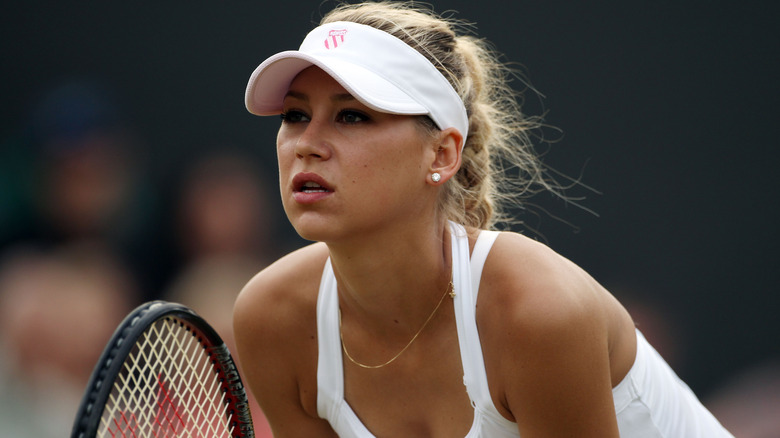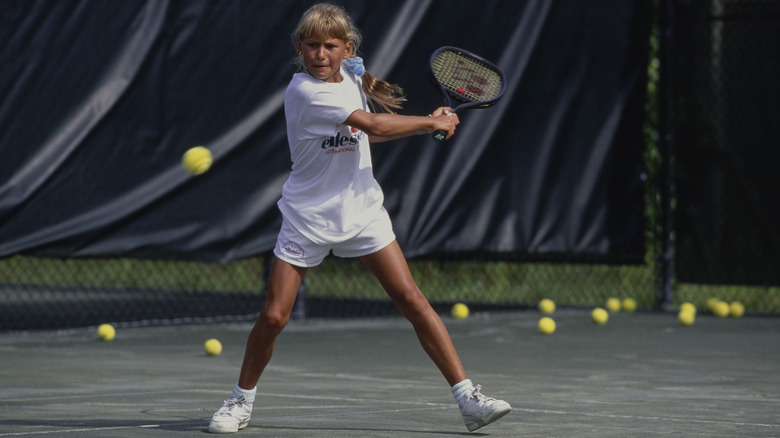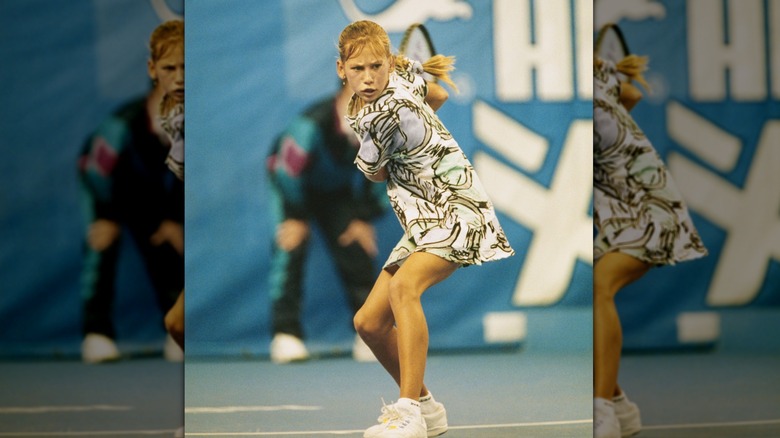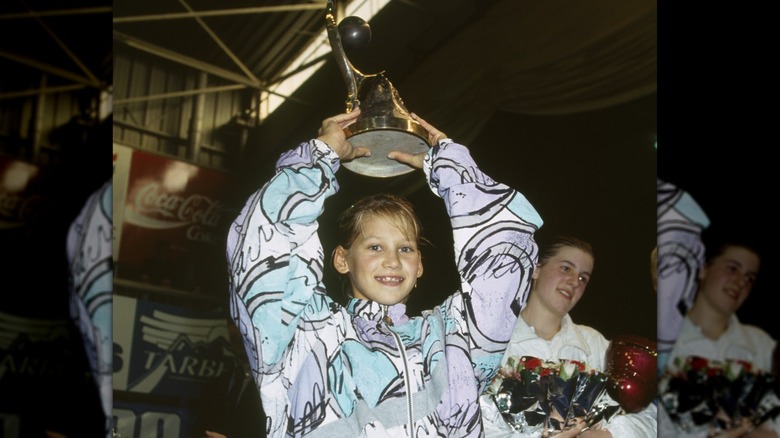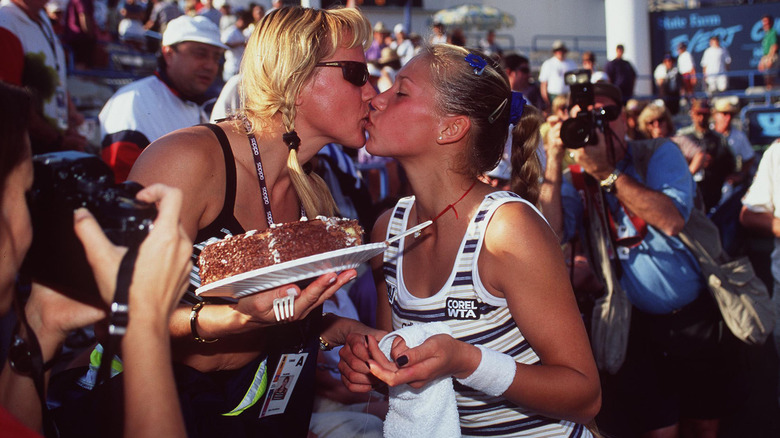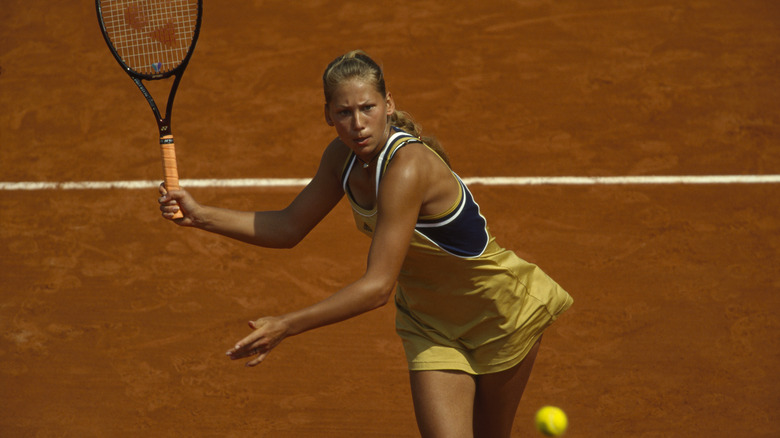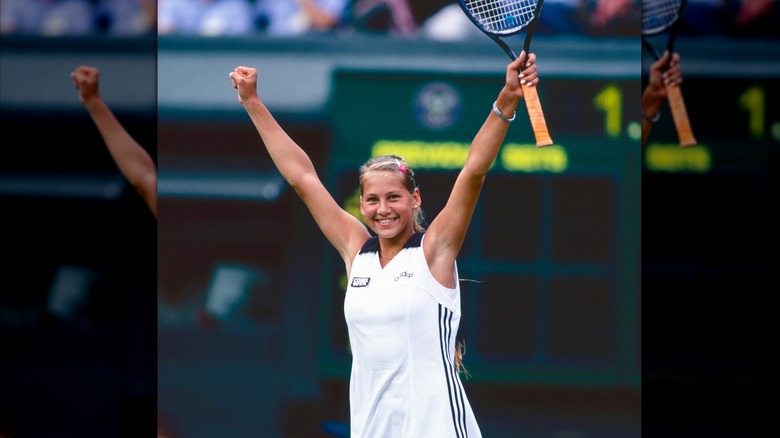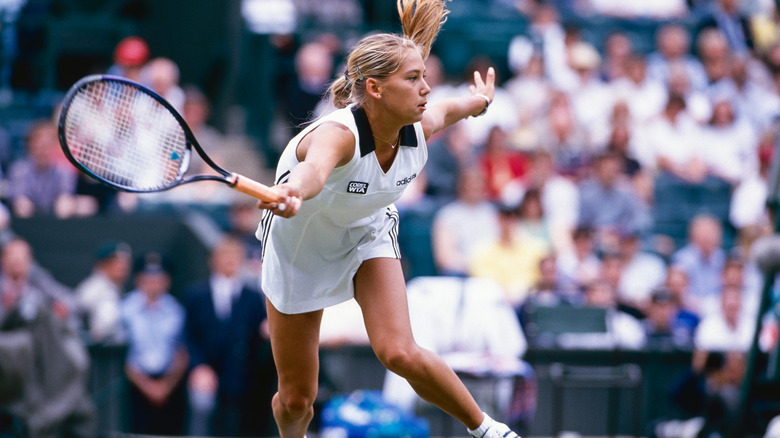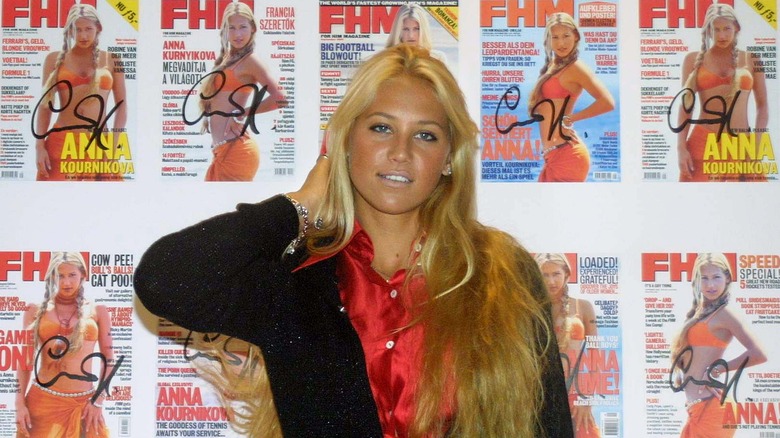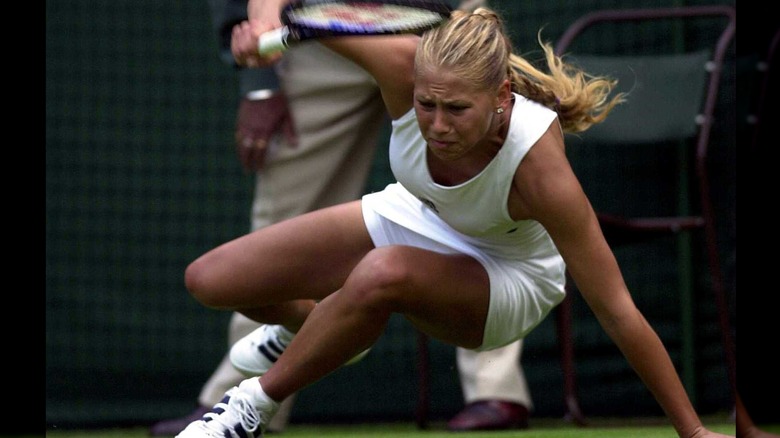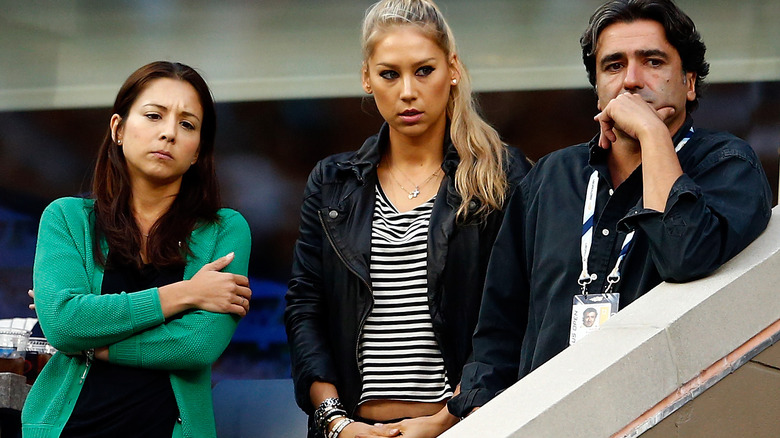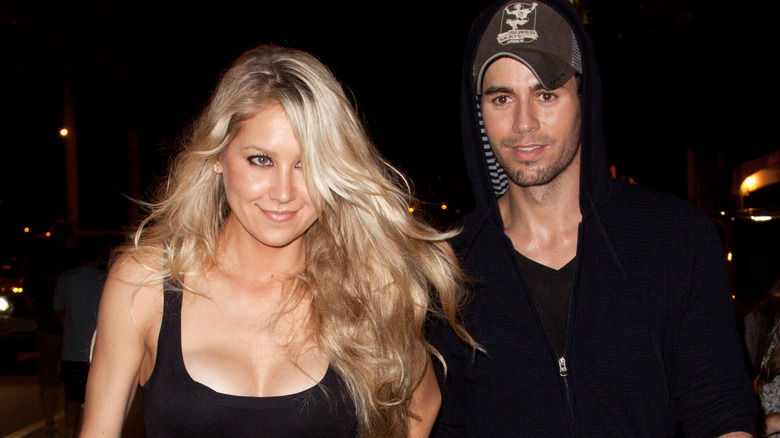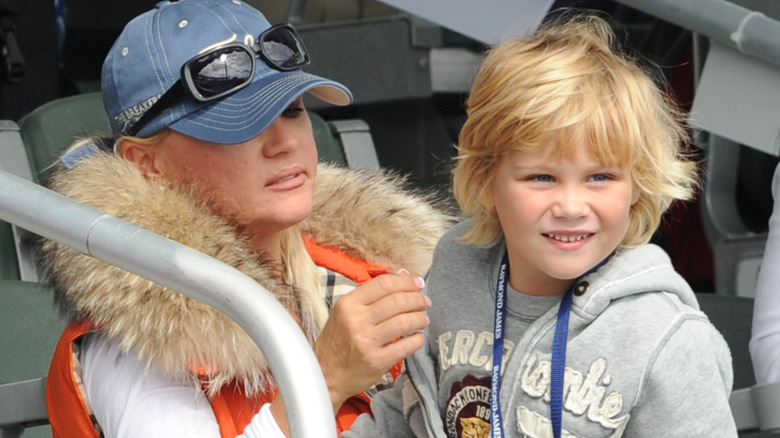Tragic Details About Anna Kournikova's Life
Back in the early 2000s, it would have been difficult to convince anyone that Anna Kournikova was enduring any kind of tragedy. After all, she was not only one of the most famous tennis players in the world — she was also among the wealthiest. In 2002, CNN reported that Kournikova was bringing in a whopping $10 million per year in endorsements. To put this number into perspective, Kournikova was out-earning top-ranked players like Venus Williams and Lindsay Davenport. Considering that Kournikova herself had never won a Grand Slam, this accomplishment was truly impressive.
Although Kournikova was financially successful, her life was far from easy. Growing up in the Soviet Union, the future tennis star lacked many of the creature comforts enjoyed by other people her age. When she did finally immigrate to the United States, things did not get much better for the young athlete. She faced an enormous amount of pressure to succeed at her sport and support her family — two responsibilities that most children never have to bear. As Kournikova grew older, these hurdles affected her more, and several of her family secrets came to light. All in all, the tennis star arguably endured a tragic childhood, in spite of all her earnings.
Anna Kournikova grew up in the USSR
These days, Anna Kournikova is known for living a luxurious life. She is partnered up with someone equally successful — Latin pop star, Enrique Iglesias. Thus far, the couple have enjoyed their money by yachting, doing philanthropic work, and wearing a lot of bling. They have also purchased a $26 million mansion in Miami, as reported by Fox News.
Although Kournikova has experienced quite a bit of comfort in her adult life, that was not always the case. As a child, Kournikova grew up in the Soviet Union — meaning that she did not always have access to technology, television, or even ripe fruits. "Back then in the Soviet Union, we didn't have that much entertainment, especially for kids. Like, there was no video games. There wasn't even cellphones," the tennis star told Jimmy Fallon (via YouTube). "We had five channels on TV."
When Kournikova moved to Florida at the age of 9, her perspective changed. "It was such a shock, but I was literally a kid in a candy store," she told Fallon. "Because, you know, it's really cold always in Russia, and here I came to Florida, and I saw bananas and apples and everything. ... We would buy bananas, and they would be super super green ... and we would put them under the bed for them to be there for a month so they would become yellow."
Anna Kournikova was responsible for supporting her family from a young age
Although Anna Kournikova has described Florida as something of a paradise, her childhood in the Sunshine State was far from easy. The tennis star remembers struggling a lot with the financial pressure that was placed on her by family members. On an episode of the Graham Norton Show, Kournikova admitted that those early years were challenging. "When I moved to America from Russia — you know I was born in Soviet Union — and I felt like because of me my whole family moved to a different continent," she recalled. "And so, I was supporting everybody, basically."
At the time, Kournikova accepted this pressure as a part of her reality. However, as the years have gone on, the tennis star has gained a new perspective on what she now views as a challenging aspect of her childhood. "Back then, I still had so much fun on the court," she told Norton in the same interview. "But, looking back at it now, I mean, I would never do that to my kid."
Anna Kournikova had very few friends
While training for competitive sports, a lot of young athletes enjoy forging lifelong friendships with their teammates. Anna Kournikova, however, was a lone wolf from the time she was small. This, of course, was not entirely by choice. The way that her former coach, Nick Bollettieri, remembers things, Anna was not permitted to have a lot of friends outside of her mother, Alla Kournikova.
In a 2002 documentary (via YouTube), Bollettieri shared, "Her mother didn't let her forget where she came from, so her interaction with the other students [at the tennis academy] was very limited. I mean, everything was A, B, C, D. You play, you eat, you go home with Mama. So, Anna, in that young life there, there was not too much social activity." In that sense, Anna lived a very lonely childhood — one in which athletic success mattered much more than social development and connection. This likely proved very difficult for the young tennis player, as she was largely isolated from the people who surrounded her.
Anna Kournikova had a complex relationship with her mother
Perhaps because of the financial pressures at hand, Anna Kournikova had a challenging relationship with her mother, Alla Kournikova. According to tennis coaching legend, Nick Bollettieri, part of the problem was that Alla interfered too much in Anna's training. Describing this dynamic in the 2002 documentary, Bollettieri said, "I believe what happened here — whether it was deliberate or not deliberate — is that Anna became too dependent on her mother. It was sort of automatic that when a ball was hit, the head would go from here to the sideline. And, when that happens, you're really not running your own ship."
In Bollettieri's view, Alla's influence on the court was negative because it prevented Anna from developing her own identity as a tennis player. "You're not able to fly like a bird and do the things because she [Anna] always had to answer to someone on the sidelines," he said. "Her mother really did run the show and sort of have different ideas of how she felt the ball should be hit. So, I really never had the chance to develop Anna Kournikova's strokes." In the long run, this lack of training would come back to haunt Anna. As her game grew and she became an increasingly high-profile player, she would find that she lacked the finishing touches necessary to become a Grand Slam winner.
Anna Kournikova has described her upbringing as military
Socializing was not the only thing that Anna Kournikova was not allowed to do during her youth. In fact, the budding tennis star was prevented from enjoying a number of normal activities as a result of her intensive training schedule. Starting at the age of 5, Kournikova was expected to play tennis for six hours every day. As she grew older, her schedule became even more vigorous, meaning that she simply did not have time for a lot of leisure.
Reflecting on this on the Graham Norton Show, Kournikova recalled, "I mean, I was really brought up — like you said — like military. Like, practice at this time, workout at this time, food, you know, therapy, all that." Because Kournikova was so busy training, she missed out on a number of fun events, like school dances. "I didn't go to prom either," Kournikova revealed in the same interview. "Because I was traveling [for tennis]."
Apparently, this upbringing has had a long-term impact on Kournikova's personality. As the former tennis professional told Norton, "I mean, I'm still really OCD and disciplined."
Anna Kournikova's tennis career peaked early on
Although Anna Kournikova's training schedule was certainly intense, there was a time when it appeared to be paying off. In 1997 — at her first Wimbledon tournament — Kournikova made it to the semi-finals. This would have been a huge accomplishment for anyone, but Kournikova was just 16 years-old at the time of her big win. Making the moment even more special, Kournikova's achievement represented a major upset. After all, at the end of 1996, she was ranked number 57 for women's tennis. To make it to the semi-finals at Wimbledon, Kournikova had to defeat the No. 5 seeded player, Iva Majoli, in the quarter-finals.
Following this tremendous performance, Kournikova became one of the most popular tennis players in the world. She would later tell the press (via YouTube), "I felt like it was something I've always dreamed of." Fans began to root for her and even gather to watch her play. Many wanted to know if the teenage tennis star would eventually become one of the greatest athletes in the world.
Alas, this was not to be. Over the course of the next five years, Kournikova would do her best to replicate the same level of success that she achieved when she was 16. Unfortunately, though, she would never make it to the finals of a singles Grand Slam tournament. Instead, she would spend the rest of her career fighting for a title that would never come.
Anna Kournikova was objectified as a minor
After Anna Kournikova's excellent performance at Wimbledon, she drew a tremendous amount of international attention. Unfortunately, however, the media zeroed in on her looks more than her tennis performance. This was particularly disturbing, considering that Kournikova was a 16 year-old minor at the time she began receiving this level of attention. In fact, Sports Illustrated journalist, Michael Silver, even admitted to flirting with the teenager in an article, writing, "And despite the fact that you are a happily married man who's twice Kournikova's age — and that her mother, Alla, who's sitting next to her, could have been your high school doubles partner — you appear to be flirting back."
Sadly, Silver was not the only one who blatantly disrespected Kournikova. The British tabloids also objectified the teenager by snapping suggestive photos of her behind during her matches at Wimbledon. "They ran all those photos of my butt," Kournikova told Sports Illustrated at the time.
Interestingly, as Kournikova grew older, she appeared to take more and more issue with the focus on her looks. In a chat with Liz Jones from The Standard, the tennis star expressed frustration at always being pinpointed as the "beautiful" one on the court. Apparently, Kournikova felt that all the focus on her looks could detract from fans' appreciation of her skills. As Jones wrote, "After an hour in her company, I came away feeling a little bit sorry for her."
Anna Kournikova struggled with all the media attention
Perhaps as a result of being sexualized and objectified at a young age, Anna Kournikova struggled immensely with the amount of media attention she received. In a 2010 press conference, Kournikova told reporters that she held them responsible for the bulk of her stardom. "Really, uhm, you know, the fame and everything, I guess most of it was created by you guys, by the media a lot of times, most of the time the yellow press," she said (via The Gazette).
Apparently, as a young person, Kournikova often felt overwhelmed by the spotlight. "Never tried to pay attention. I mean, obviously it was a little hard times dealing with it being 16, 17 years old, reading some kind of crap about yourself, you know. Most of it was made up," she added in the same press conference.
Looking back at the situation, Kournikova expressed her feeling that it's the parents' role to try protect their children from the media. "If I had a 16‑year‑old kid, I would try to guard them as much as I can and keep the focus on what the kid is supposed to do: play tennis, work out, do your therapy," she explained. Later, though, she admitted that — in a situation like hers — that would have been easier said than done. "It's hard," Kournikova confessed.
Anna Kournikova suffered a foot injury
At the end of the day, the sports star's goal was to become the No. 1 tennis player in the world. As Anna Kournikova transformed into a more mature athlete, she also suffered several major injuries. Speaking to The Guardian's Jon Henderson about her ailments, Kournikova explained, "In '97 I had a stress fracture and was out for three months; in '98 I had a torn ligament in my thumb and was out for three months; in '99 I had another stress fracture for three months; and then in 2001 I didn't basically play the whole year."
Of all these injuries, the foot fracture that Kournikova suffered in 2001 proved the most detrimental to her career. Not only did the injury land Kournikova in the operating room, but it also required a considerable amount of healing time. For an up-and-coming tennis star, this was disastrous. Weeks spent healing were weeks spent away from the court, and to truly be the best, Kournikova needed to train. As she told The Standard at the time, this injury caused her ranking to plummet to 55 among female tennis stars. Although she remained popular with fans — and continued to win endorsements — Kournikova was not satisfied with this. Her dream was to win a Grand Slam title, and it seemed to be slipping further out of reach.
Anna Kournikova was forced to retire from tennis
By the time 2003 came rolling around, Anna Kournikova's injuries had become so painful that she had no choice other than to quit tennis. Although she was just 21 years old, it was clear that Kournikova needed to retire. Her body simply would not allow her to continue playing. In a 2011 conversation with People, the athlete opened up about her reasons for stepping back from the sport. "I never planned or thought that was going to be it. My back really forced me to stop," Kournikova confessed. "It got so bad; I couldn't tie my shoes, literally. I would be in excruciating pain. I had been doing six to eight hours [of training] every day since I was 5 years old."
One would hope that most of Kournikova's injuries would heal with time. However, even as she got older, the tennis star continued to suffer from back pain. In a 2010 appearance on the Graham Norton Show, Kournikova admitted that she still hadn't fully recovered from her injuries. "I have five different problems in my back," she revealed. "But, um, it never bothers me in normal life — or when I'm just exercising. It really is because tennis is such unnatural movements for your body; it really screws up your body with all the twists and everything." Because of this, Kournikova has not been able to return to the tennis court in a professional context.
Anna Kournikova and Enrique Iglesias were stalked by the paparazzi
Just because Anna Kournikova retired, however, does not mean that she fully regained her privacy. For years after her retirement, she remained popular enough to draw interest from fans across the globe. Making matters even more complicated, the press appeared fascinated by Anna Kournikova's romantic relationship with Enrique Iglesias. As readers clamored to learn more about the photogenic young couple, Kournikova and Iglesias found themselves to be frequent targets of paparazzi stalking.
Unsurprisingly, Kournikova considered this both annoying and invasive. As the athlete revealed in a 2008 interview with Sports Illustrated, she felt particularly frustrated when photographers would leer at her and Iglesias — often in an overtly interested way. "It goes with the job, but it gets annoying when you feel violated. Just take the picture and be done," Kournikova said.
Of course, there is no controlling the paparazzi, and Kournikova's pleas for respect likely went unheeded. Kournikova and Iglesias have largely appeared to deal with this by taking a step back from the public eye and living their lives in the privacy of their own home.
The tennis player's mother, Alla Kournikova, was arrested
Despite the tragedy of her early years, Anna Kournikova's adult life has much improved. She is the mother of a son, Nicholas Iglesias, and two daughters, Lucy and Mary Iglesias. She dedicates a considerable amount of time to philanthropic organizations such as the Boys and Girls Club. She even did a stint on the "Biggest Loser."
Even as Kournikova's life evolved, the ghosts of her past came back to haunt her. In 2010, her mother, Alla Kournikova, was arrested for child neglect. As reported by the Palm Beach Daily News, the local police took her briefly into custody after Alla's then-5-year-old son, Allan Kournikova, was found soaking wet and barefoot outside her Florida home. Allan told the officers that he had leapt out of the second floor window, although he did not give an explanation as to why. The boy had apparently been left home alone while Alla went grocery shopping.
Alla ultimately pled guilty to the charges and was sentenced to three years probation. She also was given 100 hours of community service. While this news may have been quite disturbing for Kournikova, she did not make any sort of public statement regarding her mother's legal troubles.
